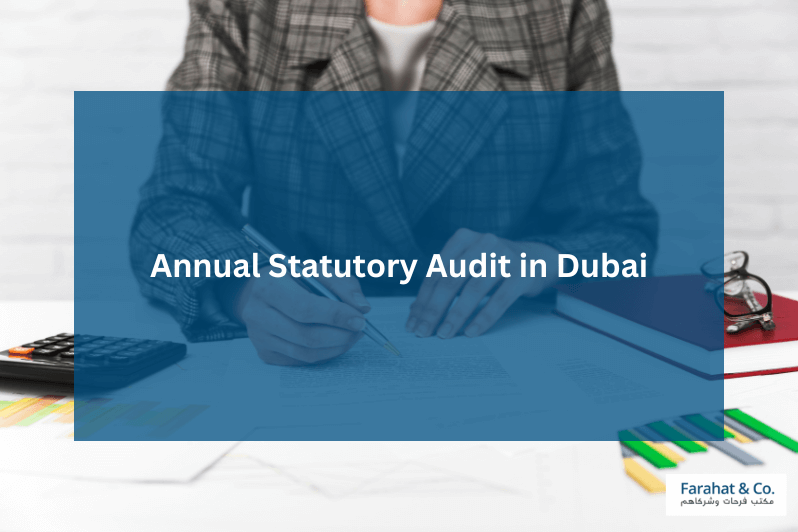Annual Statutory Audit in Dubai is an essential facet of business operation, it is an independent examination of a company’s financial statements and records to ensure their precision and compliance with accounting standards and regulations. Statutory Audit in Dubai provides assurance to stakeholders such as investors, creditors, and supervisory bodies about the company’s financial health and transparency. Thus, it is advisable for corporations to seek the services of Top Audit Firms in Dubai to ensure compliance upon implementing Annual Statutory audits.
How to Prepare for the Statutory Audit?
The following steps are essential to consider:
1. Organizing Financial Records and Documents
One of the most important steps in preparing for a statutory audit is organizing financial records and documents. Companies must confirm that their books are up-to-date and that all related documents such as;
- Bank Statements
- Invoices
- Receipts
2. Communicating with the Auditor
Communication with the auditor is important during the preparation stage. Companies should provide the auditor with all essential information and address any queries promptly. It is also imperative to establish clear communication channels to facilitate the exchange of information.
3. Identifying Potential Audit Issues
Companies should proactively identify potential audit issues and areas of concern before conducting the audit. This can include evaluating the accuracy and inclusiveness of financial records. It ensures compliance with applicable laws and regulations and reviews the efficiency of internal controls.
Read More: Internal Audit Procedures for Revenue Recognition
How to Conduct a Statutory Audit?
The important steps for conducting Statutory Audit are;
1. Audit Procedures and Techniques
During an audit, the auditor will perform numerous procedures and techniques to obtain adequate evidence about the accuracy and completeness of the financial statements. These procedures can include;
- Analyzing Financial Data
- Testing Accounting Systems and Controls
- Reviewing Supporting Documents
The auditor will also consider the company’s industry-specific threats and challenges.
2. Assessing Internal Controls and Processes
The auditor will assess the company’s internal controls and processes to ensure that they are active in detecting and preventing errors and fraud. This includes;
- Reviewing the company’s policies and procedures
- Assessing the design and implementation of internal controls
- Testing their effectiveness
Any flaws or deficiencies in the internal control system will be reported to the management.
3. Testing for Substantial Misstatements and Fraud
The auditor tests for substantial misstatements and fraud in the financial statements. This includes;
- Assessing the risk of fraud
- Testing for fraud indicators
- Reviewing related party transactions
The auditor will also evaluate the suitability of accounting estimates and confessions. Any substantial misstatements or fraud discovered during the audit will be reported to the supervision and the audit committee.
How to Resolve Audit Findings and Issues?
The following are some important steps for resolving audit findings and issues
1. Reviewing and Responding to Audit Findings
Once the statutory audit is accomplished, the auditor will provide a report with their findings and recommendations. It is essential for the company’s management to prudently review the report and respond to any identified issues in a timely and effective manner.
2. Developing Action Plans to Address Issues and Deficiencies
If any issues or deficiencies are identified during the audit, the management should improve an action plan to address them. This may involve addressing any material misstatements or fraud;
- Implementing new controls
- Improving existing processes
- Taking corrective actions
3. Communicating with Stakeholders and Regulators
It is significant for the company’s management to communicate any significant findings or issues recognized during the audit with key stakeholders, such as investors and creditors. In some cases, regulators may also need to be informed if the issues are material and require their attention.
How to Choose the Right Audit Firm?
When choosing an Audit Firm for a statutory Audit in Dubai, it is significant to consider some factors such as;
- The Firm’s Reputation
- Experience in an Audit Firm
- Qualifications of the Team
Farahat and Co. is a reputable and trusted interface in Dubai for all audit procedures, they have a team of experienced and qualified auditors committed to furnishing the best solutions to any audit complexities.
What are the Benefits of a Successful Statutory Audit?
A successful statutory audit has notable benefits for companies. Below are some major benefits of a successful Statutory Audit;
- Compliance with regulatory requirements
- Evasion of legal and financial penalties
- Enhanced integrity of financial statements
- Increased stakeholder assurance
- Finding internal control weaknesses and operational inefficiencies
- Better risk management and process enhancements
- The magnetism of investment and financing opportunities
- Boost to company status and financial standing
- Lessening of risks and improved growth opportunities
Seek the Expert Services of Top Audit Firms in Dubai
By understanding the permitted requirements and benefits of the audit, companies can certify compliance and build trust with stakeholders. It is vital to choose a trusted audit firm that can effectively navigate the audit process and provide effective solutions. Farahat and Co. is a reputable and trusted point of conduct in Dubai for all audit procedures. Therefore, contact us today and we shall be glad to assist you.
Read More: Why Financial Audit is Important for your Business?

